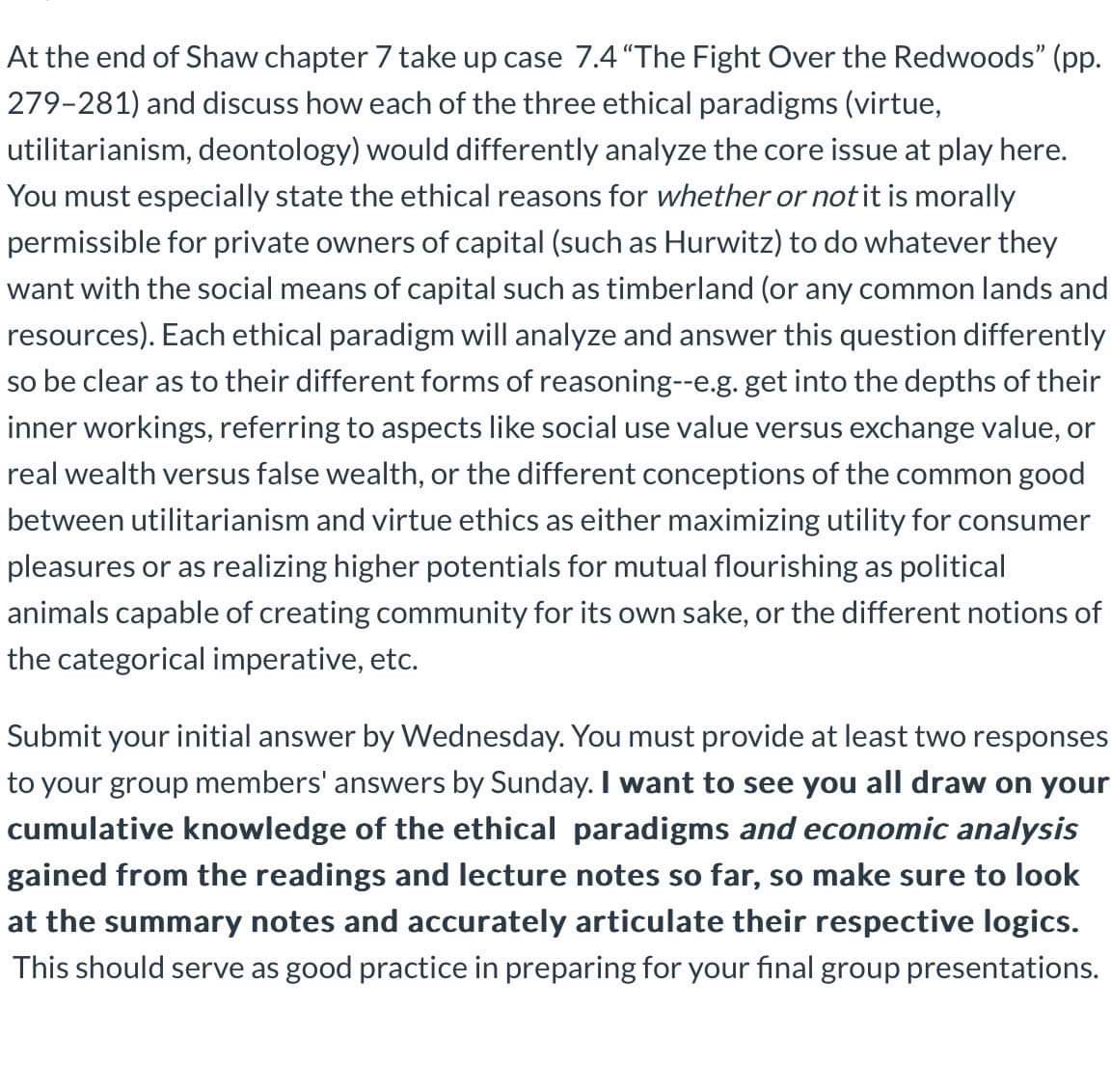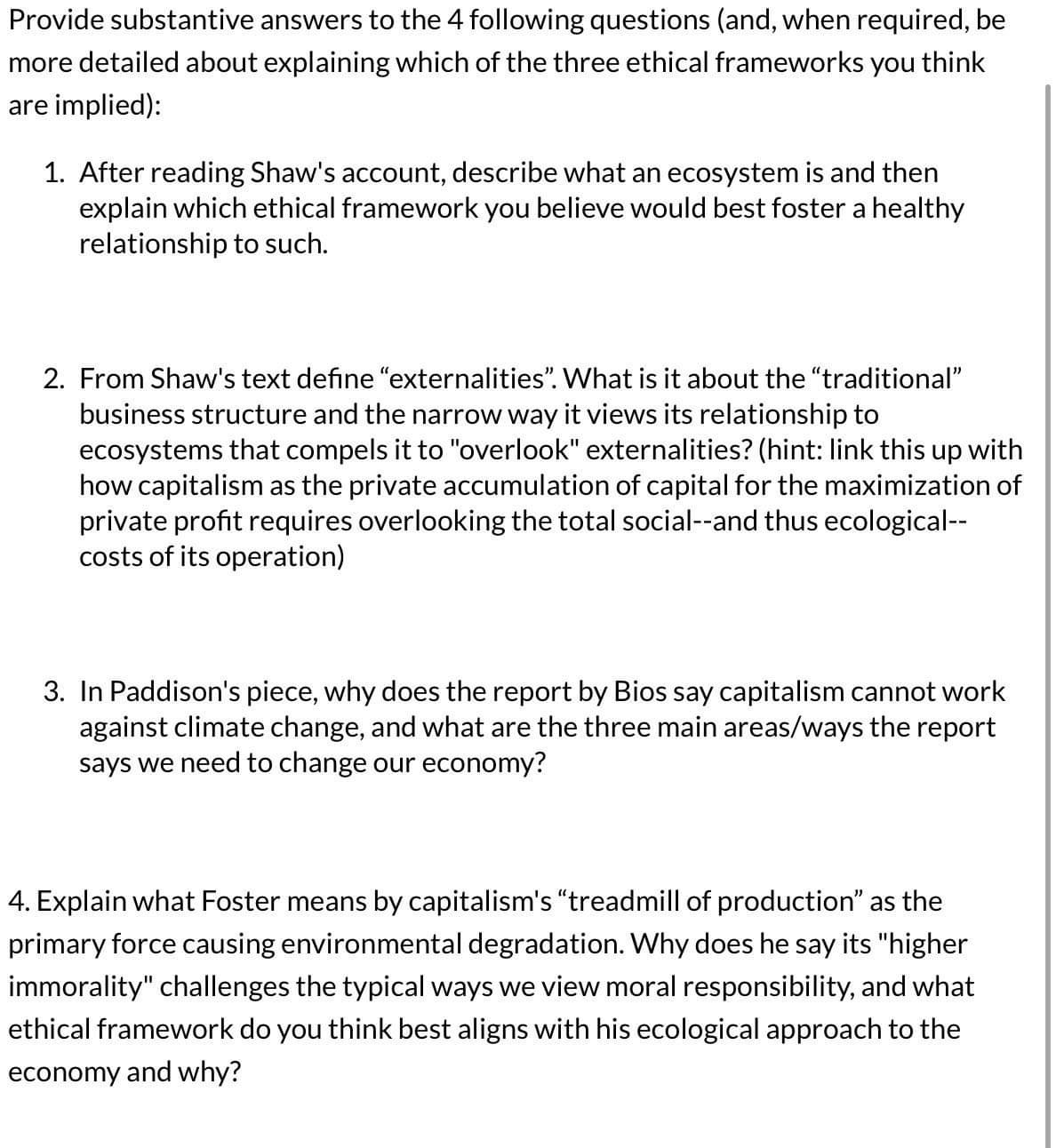Answered step by step
Verified Expert Solution
Question
1 Approved Answer
At the end of Shaw chapter 7 take up case 7.4 The Fight Over the Redwoods (pp. 279-281) and discuss how each of the three

 At the end of Shaw chapter 7 take up case 7.4 "The Fight Over the Redwoods" (pp. 279-281) and discuss how each of the three ethical paradigms (virtue, utilitarianism, deontology) would differently analyze the core issue at play here. You must especially state the ethical reasons for whether or not it is morally permissible for private owners of capital (such as Hurwitz) to do whatever they want with the social means of capital such as timberland (or any common lands and resources). Each ethical paradigm will analyze and answer this question differently so be clear as to their different forms of reasoning--e.g. get into the depths of their inner workings, referring to aspects like social use value versus exchange value, or real wealth versus false wealth, or the different conceptions of the common good between utilitarianism and virtue ethics as either maximizing utility for consumer pleasures or as realizing higher potentials for mutual flourishing as political animals capable of creating community for its own sake, or the different notions of the categorical imperative, etc. Submit your initial answer by Wednesday. You must provide at least two responses to your group members' answers by Sunday. I want to see you all draw on your cumulative knowledge of the ethical paradigms and economic analysis gained from the readings and lecture notes so far, so make sure to look at the summary notes and accurately articulate their respective logics. This should serve as good practice in preparing for your final group presentations. Provide substantive answers to the 4 following questions (and, when required, be more detailed about explaining which of the three ethical frameworks you think are implied): 1. After reading Shaw's account, describe what an ecosystem is and then explain which ethical framework you believe would best foster a healthy relationship to such. 2. From Shaw's text define "externalities". What is it about the "traditional" business structure and the narrow way it views its relationship to ecosystems that compels it to "overlook" externalities? (hint: link this up with how capitalism as the private accumulation of capital for the maximization of private profit requires overlooking the total social--and thus ecological-costs of its operation) 3. In Paddison's piece, why does the report by Bios say capitalism cannot work against climate change, and what are the three main areas/ways the report says we need to change our economy? 4. Explain what Foster means by capitalism's "treadmill of production" as the primary force causing environmental degradation. Why does he say its "higher immorality" challenges the typical ways we view moral responsibility, and what ethical framework do you think best aligns with his ecological approach to the economy and why
At the end of Shaw chapter 7 take up case 7.4 "The Fight Over the Redwoods" (pp. 279-281) and discuss how each of the three ethical paradigms (virtue, utilitarianism, deontology) would differently analyze the core issue at play here. You must especially state the ethical reasons for whether or not it is morally permissible for private owners of capital (such as Hurwitz) to do whatever they want with the social means of capital such as timberland (or any common lands and resources). Each ethical paradigm will analyze and answer this question differently so be clear as to their different forms of reasoning--e.g. get into the depths of their inner workings, referring to aspects like social use value versus exchange value, or real wealth versus false wealth, or the different conceptions of the common good between utilitarianism and virtue ethics as either maximizing utility for consumer pleasures or as realizing higher potentials for mutual flourishing as political animals capable of creating community for its own sake, or the different notions of the categorical imperative, etc. Submit your initial answer by Wednesday. You must provide at least two responses to your group members' answers by Sunday. I want to see you all draw on your cumulative knowledge of the ethical paradigms and economic analysis gained from the readings and lecture notes so far, so make sure to look at the summary notes and accurately articulate their respective logics. This should serve as good practice in preparing for your final group presentations. Provide substantive answers to the 4 following questions (and, when required, be more detailed about explaining which of the three ethical frameworks you think are implied): 1. After reading Shaw's account, describe what an ecosystem is and then explain which ethical framework you believe would best foster a healthy relationship to such. 2. From Shaw's text define "externalities". What is it about the "traditional" business structure and the narrow way it views its relationship to ecosystems that compels it to "overlook" externalities? (hint: link this up with how capitalism as the private accumulation of capital for the maximization of private profit requires overlooking the total social--and thus ecological-costs of its operation) 3. In Paddison's piece, why does the report by Bios say capitalism cannot work against climate change, and what are the three main areas/ways the report says we need to change our economy? 4. Explain what Foster means by capitalism's "treadmill of production" as the primary force causing environmental degradation. Why does he say its "higher immorality" challenges the typical ways we view moral responsibility, and what ethical framework do you think best aligns with his ecological approach to the economy and why Step by Step Solution
There are 3 Steps involved in it
Step: 1

Get Instant Access to Expert-Tailored Solutions
See step-by-step solutions with expert insights and AI powered tools for academic success
Step: 2

Step: 3

Ace Your Homework with AI
Get the answers you need in no time with our AI-driven, step-by-step assistance
Get Started


